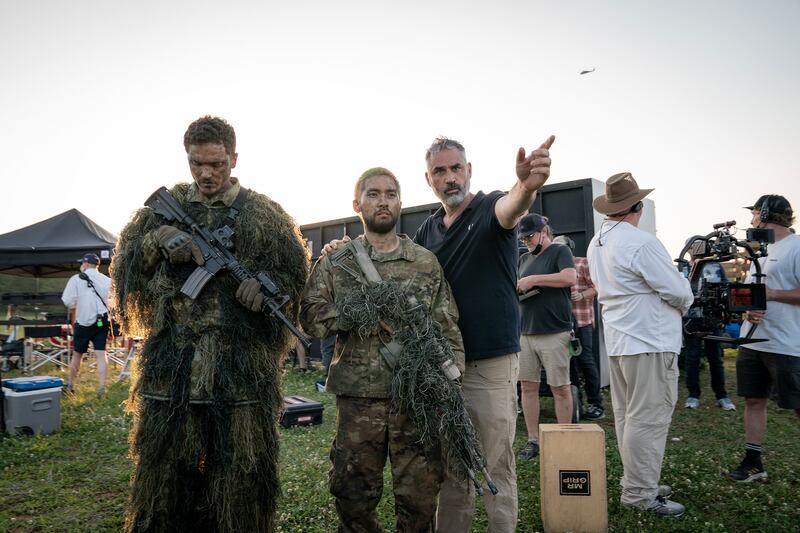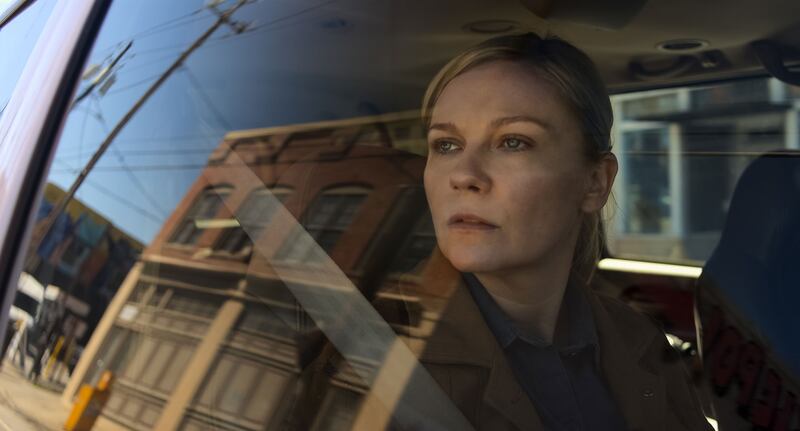Between his zombie classic 28 Days Later, his unnerving AI drama Ex Machina, his eco-catastrophe epic Annihilation, and his toxic-masculinity nightmare Men, Alex Garland has proven himself the master of modern big-screen sci-fi and horror, all while exhibiting an enduring fascination with extinction-grade individual and social-order disaster. Nonetheless, he’s never plumbed such fears in as timely a fashion as he does with Civil War.
A near-future vision of America’s devolution into chaos, the English writer/director’s latest (April 12, in theaters) is a trip through a hellscape of ruined cities, fortified suburbs, and ravaged plains, all of them torn asunder by a conflict that Garland only explicates in hazy detail. The point isn’t the precise political machinations that led the United States into disrepair; rather, the focus is on the underlying forces of hatred, tribalism, greed, intolerance, and insanity that have corrupted the nation and its citizens beyond repair, leaving only wreckage in their wake.
Civil War embarks upon its journey through this terrifying wasteland by tagging along with celebrated photojournalist Lee (Kirsten Dunst), her reporter partner Joel (Wagner Moura), wary media vet Sammy (Stephen McKinley Henderson), and aspiring war correspondent Jessie (Cailee Spaeny) as they attempt to reach Washington, D.C., to interview the soon-to-be-deposed president (Nick Offerman). Pitstop after harrowing pitstop, skirmish after bloody skirmish, what they discover is a country rotting from the inside, and what Garland conjures are vistas of ruin and heartache that—like the photos that Lee and Jessie take, and are desperate to believe in as possible agents of change—are designed to terrify and enrage. Eschewing pedantic exposition in favor of formally daring apocalyptic mayhem and madness, it’s a blockbuster that’s both a dirge and a rallying cry, as sorrowful as it is nerve-racking.
For the acclaimed writer/director, Civil War serves as an opportunity to tackle our precarious present moment from a pointedly askew angle. Employing an episodic road-trip template in order to investigate the fissures threatening domestic (and global) democracy, it’s sure to inspire heated debate upon its theatrical release. Before the arguments begin, we sat down with Garland to discuss the origins of his dystopian thriller, its connections to our contemporary reality and his own prior work, the media’s vital role in democracies, and recent reports that he’s planning to step away from directing.

Alex Garland behind the scenes of 'Civil War'
Murray Close/A24There have been numerous conflicting news items about your desire to take a hiatus from directing. Can you clear that mess up for us, once and for all?
I find this sort of mystifying in some respects. I said I’m going to stop directing for the foreseeable future—that’s the statement. Pretty much no ambiguity. It’s just a really simple, uncontentious statement. I also talked about the fact that I’m screenwriting. I’m writing a film right now, I’m working with a guy named Ray Mendoza, and I’m working with Danny Boyle, who’s a director I worked with many years ago. As far as I’m concerned, screenwriting is included in filmmaking. It’s not just this one person, the director, who’s doing everything. There’s a whole bunch of people: screenwriters, directors of photography, editors, production designers. So I think the whole thing is bullshit.
Civil War is dystopian fiction but it takes great pains to be realistic. Is that a reflection of your own legitimate concern about our impending future?
Yeah, I’d say so—and I also think it’s not just me. I think it’s quite shared. I think a lot of people feel anxious. I don’t think it’s really debatable that your country, my country, many European countries, and countries in the Middle East and Asia and South America have incredibly divided politics, populist politics, which leads to division and also leads to extremism unless it’s guarded against. I think we all know that and share it.
Listen, we don’t all know it. Of course there will be some outliers who might actually want that. But broadly speaking, people do not want to live in a divided country and feel unnerved by it. The film is a product of that, definitely.
I like to keep myself pretty blind to a movie before I see it…
Good. So do I, by the way. I agree.
However, I did know that Civil War had made some initial online noise because its trailers indicated that the “Western Forces” secessionists are a coalition of California and Texas, which in 2024 America wouldn’t be a logical alliance. Wasn’t that the point, though—to create a scenario that was divorced enough from reality that you didn’t have to worry about constantly creating believable one-to-one parallels that tied your hands, creatively speaking?
That’s absolutely one part of the thinking; there are other things as well. But what I’m going to mention is that you mentioned “online noise.” Online noise is part of the issue. Very, very fast, reflexive leaps to judgment, and a form of communication, and a kind of hysteria behind the communication, that is not exactly representative of the way that people talk to each other when they’re talking in the way that we’re talking now. That relates to that generalized sense of anxiety I was talking about. Again, there are outliers, for sure, but most people are pretty thoughtful, pretty courteous, pretty respectful, and really good-natured in their communication with each other. That somehow is not reflected online.
But equally, the thing that appears online—which is hysteria—begins to seem as if it’s the dominant state, even though, in most people’s lives, it isn’t the dominant state. There’s a tension there, and I think there’s something really problematic about it. Because it’s like we’re being led, hard and fast, by something illusory and untrustworthy.
It also seems that such hysteria is born from an ignorance of the thing it’s about—as was the case with Civil War, where online reactions were to a snippet from a trailer, rather than the entire movie, which no commentators had seen yet.
It’s that they haven’t seen part of it. You could have a strong judgment or response, but it would be better to base that on the thing rather than the thing that you think might be the thing. But that is in the nature of online discourse which, amongst other things, encourages quick responses.
So yeah, it’s tricky. I don’t think [social media] is a natural fit with humans, in terms of how they are with other humans. It’s something else. I try not to participate in it. The film itself attempts to function more like people communicate, rather than how public discourse communicates.
A film I thought about while watching Civil War was 28 Days Later, given that both are about the aftermaths of democratic socio-political collapse. Since you’re currently collaborating with Danny Boyle on a follow-up, were you actively thinking about it while making this, or was that a subconscious sort of connection?
No, you’re right, actually. 28 Days Later’s story came from various things, but one of the things it came from was, just before I wrote it, having come back from a country that was in quite an extreme state of collapse, and sort of bringing some of that to the U.K. So yes, there is a connection.
And yes, it’s also true that Danny and I are working together—in fact, Danny’s in pre-production on a film that’s in that [storyline]. It’s 28 Years Later, as opposed to Days or Weeks. He begins shooting that pretty soon.
When you asked your first question, there’s various reasons I’m not directing. The main reason is that, at the moment, I’m working as a screenwriter. I’ve written a screenplay for Danny, and I’m working with Ray Mendoza, and there are two other people I’m also working with. That’s my job at the moment: screenwriting.
How much did you strive to keep one-to-one political parallels out of the movie? There’s Charlottesville, and some other details, that directly recall present-day America, but Civil War feels less concerned with those specifics than with the undercurrents that give rise to division.
My focus was often on the tone of how something was said. I would not say the film is non-political, and I wouldn’t say it excludes parallels. I would say it’s the means of communication, which attempts to be thoughtful and kind of looking to engage in a conversation rather than a shouting match.

Kirsten Dunst
A24A scene that’s stuck with me is the characters’ early stop at the gas station, where they discover a trio of militiamen who’ve hung two captives in the adjoining car wash—ostensibly because one gunman knew one of the victims in high school, and the guy didn’t talk to him much. It feels like those sorts of resentments are rampant today, and they’ve become weaponized. Can you talk about why you felt that scene, and those ideas, were so important?
If you were to say that a civil war is a kind of end product of division and divisiveness, then that means that the end product and earlier points in the sequence have something in common. There’s a tragedy in what they have in common, and it’s to do with families and neighbors and work colleagues and friends dividing themselves. That is something that just feels sad and unnecessary sometimes, because there is more commonality than there is division, and so much of the division can be overcome by conversation, which includes listening. It’s not just speaking; it’s listening.
One of the things I feel is that there is an area where people get divided—that it is possible to be completely understanding of other people’s points of view. One of them would include old-fashioned left-wing and right-wing politics. I’ll just give an example. Right-wing politics, in a traditional ideological sense, is talking about things like free markets, and left-wing politics is talking about things like regulated markets. Right-wing politics might say, low taxation to encourage economic growth, which helps people in poverty because economic growth helps them. Left-wing politics might say, higher taxation from people who can afford it in order to create welfare for people in poverty to help them lift out of it. Those are just ideological positions on how to run a state, and neither of them are inherently evil. Both of them actually might have a goal that the other side might appreciate; they just might feel that [the other’s approach] is not the right way to go about it. But there is nothing contained in that which should require hatred. Nothing.
But all sorts of other things have been glommed onto these positions that maybe have nothing to do with political ideology. They’re to do with ethical positions or things that don’t exist in that framework. That are separate, really. That is, I suspect, part of the source of the division. I have a political ideology myself; I will tend to vote a certain kind of way. And I have good friends and colleagues who think differently from me, and that is unproblematic.
In a polarized state, what happens is, somebody says, “Yeah, but that person also believes in this, this, this, and this.” They start dragging in other things, and that isn’t always true. That isn’t always the case. They don’t necessarily believe in all those other things. But you can’t get to all of that without talking—and, frankly, without being respectful.
I felt like the movie is, in a certain sense, about images, and their power to affect change. Was that the thinking behind making Lee and Jessie not just reporters but, more specifically, photojournalists?
It’s honestly about reporting. It’s about journalism. Whatever system of checks and balances you create, governments sometimes get corrupt, they have corrupt people within them, and somebody needs to be a check and balance against that. The people who are checks and balances against that are the press. Free and fair media, holding governments to account. In order to do that effectively, the press needs to be trusted. That trust can be undermined by other people, or undermined by context, but it can also be undermined by itself.
There’s an old-fashioned form of journalism that attempts, as much as possible, to remove bias from its reporting. The reason for that is, if a news organization has a clear bias, it will be believed by its choir that it’s preaching to, and won’t be believed by the other choirs. More and more news organizations have become dominated by bias, so this is a throwback to an older form of journalism, which is reporting. Then, the film is attempting to function like a reporter. It’s about reporters, and it’s trying to be like a reporter itself.
Another movie I thought about during Civil War was Matthew Heineman’s A Private War, both in the early scene where reporters gather in a hotel lobby to decompress after their harrowing day, and also in Joel’s attraction to the adrenaline rush of his battlefield work. Did you research war correspondents, to get a feel for their habits, their psyches, and their dynamics?
I grew up around it. My dad was a cartoonist on a newspaper, his friends were journalists, and I grew up around the kitchen table with them, and them sometimes living with us. I never had the antagonism that some people feel towards journalism. I knew that they could sometimes be spiky or compromised or tricky people, but they were also often very brave and very dedicated.
My godfather was a foreign correspondent who often covered conflict. My brother’s godfather, a different guy, was also a foreign correspondent who covered conflict. One of them is dead now, but I’ve known them my whole life, and, in fact, the last time I saw my brother’s godfather was two weeks ago, when we went out for dinner. I’ve spent a lot of time with them, I’ve traveled with those guys, and so I didn’t exactly research it; it was a world I grew up in.
But you didn’t want to go into journalism yourself?
No, I did. I absolutely did. When I was younger, I really admired these guys—I loved them, actually—and I thought they were fantastic. My hope and ambition was that I would be a foreign correspondent myself one day. But I wasn’t able to do it, for various reasons. The simplest one is that I love traveling very much, and going to all sorts of different places around the world, but I’m not able to write non-fiction. I tried, and I just couldn’t really do it. So I ended up writing fiction. In fact, I wrote, in a way, a sort of travel book in the form of a novel, which is how I started out—a book called The Beach. If you’d asked me when I was 15—or when I was 21, or even 8, probably—that’s what I would have said. But it didn’t work out that way.







